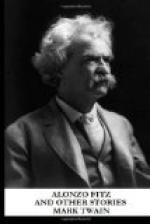“I’m sorry.”
No reply.
“Miss Ethelton!”
“Well?”
“You you’re there yet, ain’t you?”
“Yes; but please hurry. What did you want to say?”
“Well, I—well, nothing in particular. It’s very lonesome here. It’s asking a great deal, I know, but would you mind talking with me again by and by—that is, if it will not trouble you too much?”
“I don’t know but I’ll think about it. I’ll try.”
“Oh, thanks! Miss Ethelton! . . . Ah, me, she’s gone, and here are the black clouds and the whirling snow and the raging winds come again! But she said good-by. She didn’t say good morning, she said good-by! . . . The clock was right, after all. What a lightning-winged two hours it was!”
He sat down, and gazed dreamily into his fire for a while, then heaved a sigh and said:
“How wonderful it is! Two little hours ago I was a free man, and now my heart’s in San Francisco!”
About that time Rosannah Ethelton, propped in the window-seat of her bedchamber, book in hand, was gazing vacantly out over the rainy seas that washed the Golden Gate, and whispering to herself, “How different he is from poor Burley, with his empty head and his single little antic talent of mimicry!”
II
Four weeks later Mr. Sidney Algernon Burley was entertaining a gay luncheon company, in a sumptuous drawing-room on Telegraph Hill, with some capital imitations of the voices and gestures of certain popular actors and San Franciscan literary people and Bonanza grandees. He was elegantly upholstered, and was a handsome fellow, barring a trifling cast in his eye. He seemed very jovial, but nevertheless he kept his eye on the door with an expectant and uneasy watchfulness. By and by a nobby lackey appeared, and delivered a message to the mistress, who nodded her head understandingly. That seemed to settle the thing for Mr. Burley; his vivacity decreased little by little, and a dejected look began to creep into one of his eyes and a sinister one into the other.
The rest of the company departed in due time, leaving him with the mistress, to whom he said:
“There is no longer any question about it. She avoids me. She continually excuses herself. If I could see her, if I could speak to her only a moment, but this suspense—”
“Perhaps her seeming avoidance is mere accident, Mr. Burley. Go to the small drawing-room up-stairs and amuse yourself a moment. I will despatch a household order that is on my mind, and then I will go to her room. Without doubt she will be persuaded to see you.”
Mr. Burley went up-stairs, intending to go to the small drawing-room, but as he was passing “Aunt Susan’s” private parlor, the door of which stood slightly ajar, he heard a joyous laugh which he recognized; so without knock or announcement he stepped confidently in. But before he could make his presence known he heard words that harrowed up his soul and chilled his young blood, he heard a voice say:




